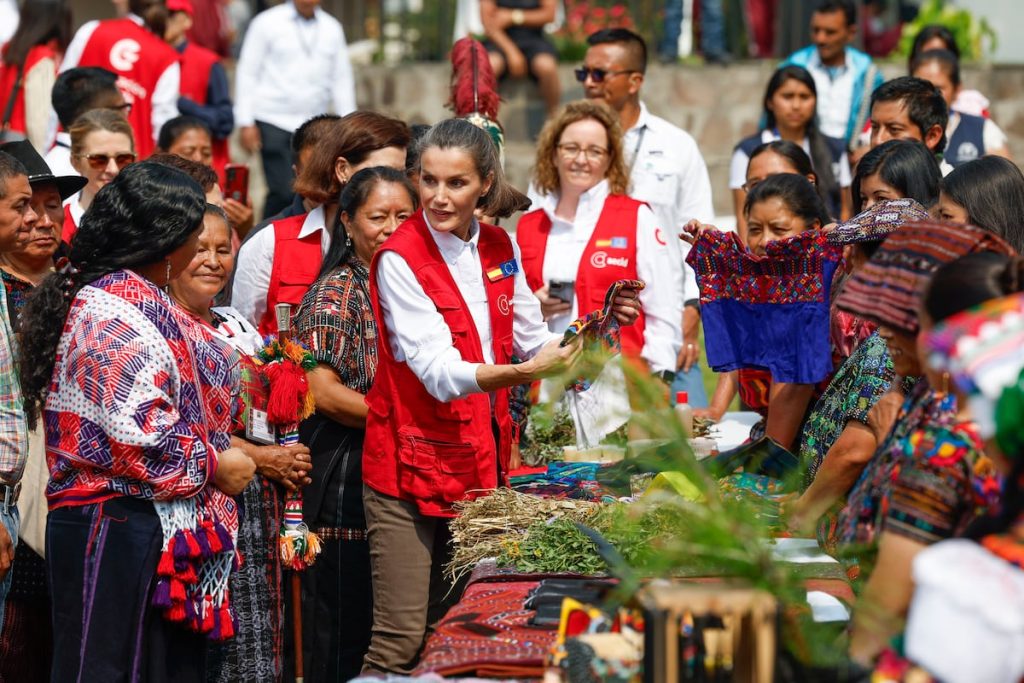Abigail Sambón was only five years old when she was raped by her 13-year-old cousin. “We were at his house playing with our younger siblings. He sent them to the garden to pick flowers. That’s when he started to rape me.” Daily Fernández, 15, had sexual relations with her uncle last year. Now she cradles two-month-old Teo Gael in a blanket while waiting to see the psychologist at the Center for Support for Survivors of Violence Against Women in Chimaltenango, Guatemala, which serves about 400 women a year. These testimonies are just a few of the tens of thousands of women who suffer from machista violence in Guatemala, a country of 17 million people where there were an average of 19 rapes per day in 2022, according to the United Nations. Queen Letizia, on her ninth cooperation trip with the Spanish Agency for International Development Cooperation (Aecid), has highlighted the precarious situation of women in the country.
In Guatemala, where nearly 50% of the population is indigenous, women and girls, especially those from indigenous communities, suffer even more from machismo violence. Imelda Petronila Estacuy, 58, the mayor of Santa Lucía de Utatlán, is well aware of this. Dressed in traditional Mayan clothing with a gold-covered denture, she has spent her life teaching men and women about equality, despite facing harassment. She explains, “Many men say that we have no rights, no voice, no vote. Women are still very intimidated. Machismo never ends in this country.” The visit of Queen Letizia aims to shed light on the challenges faced by remote communities to improve access to basic services such as water and sanitation, and to combat malnutrition, affecting 46% of children under five years old.
The Aecid has invested six million euros in providing sanitation and hygiene systems to more than 200,000 people in Guatemala’s remote areas, showing tangible results in improving children’s health through hygiene practices. The issue of water is crucial for women’s development and safety. Before the Aecid’s support, women like Rosa Díaz Vázquez had to travel long distances carrying water containers on their heads, babies on their backs, and sometimes pregnant, to bring clean water home. The Queen’s visit serves as an opportunity to raise awareness about the persistent inequalities and showcase the progress being made through advocacy and political education initiatives.
Queen Letizia’s cooperation trips not only showcase Spain’s work abroad but also serve as a form of “high diplomacy,” reinforcing political, economic, and social relations through development aid. The Queen, accompanied by the Secretary of State for Cooperation Eva Granados Galiano, met with local authorities, NGO representatives, aid workers, and project beneficiaries, as well as the First Lady and various ministers. Granados Galiano emphasized Spain’s commitment to Guatemala, highlighting the significance of these trips in demonstrating Spain’s cooperation efforts with partner countries. By supporting gender equality initiatives, infrastructure development, and educational programs, Spain aims to address the root causes of gender-based violence and inequality in Guatemala.
While the focus of the Queen’s trip was on addressing the risks and challenges facing women in poverty-stricken areas, she also took the opportunity to highlight the work of Spanish cooperation in youth empowerment. Through visits to vocational training centers like the one attended by Zaida Guzmán, 16, in a dangerous neighborhood in Guatemala City, Queen Letizia emphasized the importance of providing opportunities for young people to break free from the cycle of poverty and violence. These schools offer practical training to equip young people with skills while keeping them away from criminal influences like gangs and drug trafficking. The Queen’s visit serves as a testament to the impact of Spain’s investments in empowering youth and promoting sustainable development in Guatemala.


